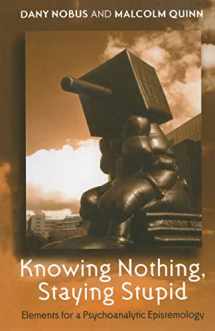
Knowing Nothing, Staying Stupid
FREE US shipping
Book details
Summary
Knowing Nothing, Staying Stupid (ISBN-13: 9781583918685 and ISBN-10: 158391868X), written by authors
Quinn, Nobus, was published by Routledge in 2005.
With an overall rating of 3.5 stars, it's a notable title among other
Mental Health
(Psychoanalysis, Psychology & Counseling, Psychotherapy, TA & NLP, Reference, Clinical Psychology, Psychology, Psychoanalysis, Psychotherapy, TA & NLP, Reference, Epistemology, Philosophy) books. You can easily purchase or rent Knowing Nothing, Staying Stupid (Paperback) from BooksRun,
along with many other new and used
Mental Health
books
and textbooks.
And, if you're looking to sell your copy, our current buyback offer is $0.3.
Description
Why is stupidity sublime? What is the value of a 'dialectics of ignorance' for analysts and academics? Knowing Nothing, Staying Stupid draws on recent research to provide a thorough and illuminating evaluation of the status of knowledge and truth in psychoanalysis. Adopting a Lacanian framework, Dany Nobus and Malcolm Quinn question the basic assumption that knowledge is universally good and describe how psychoanalysis is in a position to place forms of knowledge in a dialectical relationship with non-knowledge, blindness, ignorance and stupidity. The book draws out the implications of a psychoanalytic theory of knowledge for the practices of knowledge construction, acquisition and transmission across the humanities and social sciences. The book is divided into two sections. The first section addresses the foundations of a psychoanalytic approach to knowledge as it emerges from clinical practice, whilst the second section considers the problems and issues of applied psychoanalysis, and the ambiguous position of the analyst in the public sphere. Subjects covered include: The Logic of Psychoanalytic Discovery Creative Knowledge Production and Institutionalised Doctrine The Desire to Know versus the Fall of Knowledge Epistemological Regression and the Problem of Applied Psychoanalysis This provocative discussion of the dialectics of knowing and not knowing will be welcomed by practicing psychoanalysts and students of psychoanalytic studies, but also by everyone working in the fields of social science, philosophy and cultural studies.


We would LOVE it if you could help us and other readers by reviewing the book
Book review

Congratulations! We have received your book review.
{user}
{createdAt}
by {truncated_author}


